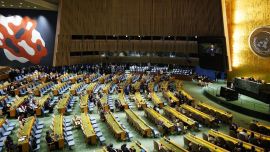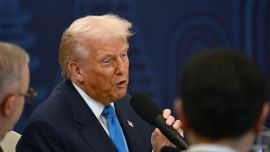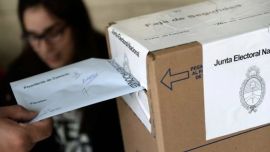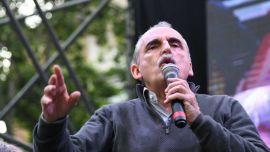The government slapped on its first capital control yesterday after a punishing week for the peso, economic indicators and Argentine assets on local and international markets.
A resolution from the Central Bank announced that banks and financial institutions were now required to seek authorisation before transferring earnings abroad.
In practice, it establishes a capital control that only applies to banks and the profits generated by their operations in Argentina.
“Financial institutions must have the prior authorisation of the Central Bank of the Argentine Republic for the distribution of their results,” a statement read.
The move comes just days after officials announced the government would postpone US$7 billion of payments on short-term local notes held by institutional investors this year and seek the “voluntary reprofiling” of US$50 billion of longer-term debt.
The measure, which was set in place via Communication “A” 6768, comes with the peso depreciating further against the dollar in the exchange markets.
The Central Bank and the Treasury have been haemorrhaging dollars this week, selling more than US$200 million on three consecutive days. On the last working day before the PASOs, the government held US$66.3 billion in reserves. But yesterday they stood at just above US$54 billion, a slump of over 15 percent in three weeks.
Consultancy firm Capital Economics estimates that net reserves – which exclude deposits at commercial banks – were already at US$19 billion earlier in the week, down from US$30 billion in mid-April.
That only covered a quarter of Argentina’s gross external financing needs of US$100 billion, which includes debt maturing over the next year plus the current account deficit.
On Friday at the close, the dollar was selling at 61.55 pesos at Banco Nación, having dropped a further 1.64 percent in a day, bringing its slump this week to a full seven percent. JP Morgan’s country risk rating for emerging markets had soared to 2,536 points – the highest figure since 2005.
As rumours more controls might be coming down the line, Mendoza Senator (UCR) Julio Cobos said that if the Mauricio Macri administration’s plan to restructure its debt does not work, the Government will have “no alternative” but to establish more widespread capital controls.
‘Selective default’
The latest spell of financial turbulence was exacerbated when Standard & Poor’s Global Ratings cut Argentina’s foreign and local debt to an assessment of “selective default” for a day, following the government’s announcement Wednesday that it would postpone payments on as much as US$101 billion of debt as money poured out of the country.
“Following the continued inability to place short-term paper with private-sector market participants, the Argentine government unilaterally extended the maturity of all short-term paper on August 28,” the ratings agency said in a statement on Thursday evening. “This constitutes default under our criteria.”
S&P said it would lift the rating back up to ‘CCC’ (or “vulnerable to nonpayment”) on Friday since the new terms for the short-term debt came into effect immediately. The announcement also prompted Fitch Ratings to declare the nation in default, citing the delayed payments on local notes.
Bonds extended their decline Friday, though drops were more muted than previous days, probably since investors are already pricing in an over 90 percent chance of default in the next five years.
Argentina’s century bond sold just two years ago fell below 40 cents on the dollar for the first time.
The peso and Argentine assets have tumbled over the past few weeks since opposition leader Alberto Fernández routed President Mauricio Macri in the August 11 primary vote. The peso is down more than 20 percent since then and bonds have hit record lows, with investors pricing in an over 90 percent chance of default in the next five years.
In a bid to calm panic and stabilise the mutual fund industry, the Central Bank offered to buy local notes held by the funds, providing liquidity that they in turn can use to meet a surge in investor redemption requests.
Harvard University economist Carmen Reinhart told Bloomberg this week she believed an Argentine default is all but inevitable – and that it would likely come sooner rather than later.
Reinhart described the government’s re-profiling plan as already a default on domestic debt, which rating companies will likely promptly respond to. While asking bondholders for more time doesn’t configure a default on its foreign obligations, it would be “a miracle if they get to six months.”
‘reprofiling’
In an eye-catching announcement, the government said Wednesday it would postpone US$7 billion of payments on short-term local notes held by institutional investors this year and seek the “voluntary reprofiling‘’ of US$50 billion of longer-term debt.
Speaking at a press conference, Finance Minister Hernán Lacunza also said the government start talks over repayments on US$44 billion it has received from the IMF.
However, he said that while those talks would begin before the October 27 general election, they would not be finished until after the new government takes over on December 10. The request for repayment extensions aims to allow the next government to “deploy its policies without financial restrictions.”
An IMF delegation was visiting Argentina but has now returned, the Fund’s spokesman Gerry Rice said in a statement .
“Regarding the debt operation announced by the Argentine authorities today, Fund staff is in the process of analyzing them and assessing their impact,” Rice said.
The IMF’s executive board announced Friday that it had convened for an informal meeting on Argentina, at which staff were expected to update officials on the country. No decision was expected about the Fund’s US$57-billion rescue package, nor the next disbursement of its credit-line.
CROSSROADS
Now eyes are on the opposition and their response. Fernández now finds himself at a crossroads: by supporting the debt renegotiation, he could boost Macri’s battered election chances; but shunning the move could reek of opportunism and hypocrisy, given his team have suggested the idea previously.
President Macri’s decision to send a bill to Congress to debate the plan to extend local debt maturities will eventually force the opposition to take a stance one way or another. F
ernández all-but echoed Reinhart’s terms on Friday, when he gave his first interview to a foreign media outlet, The Wall Street Journal.
The Frente de Todos leader described the government’s move to restructure short-term debt as proof Argentina was virtually insolvent and said that he was unwilling to support the government’s debt plan. By contrast, he would look to boost consumption and wouldn’t ask permission from the IMF to do it.
“Now, there is no-one taking Argentine debt, or anyone who can pay it. Argentina is in a virtual, hidden default,” he told the US newspaper.
Market turbulence triggers bank withdrawals in Argentina
In a slow but steady trickle, locals are withdrawing their deposits in foreign currency amid the contagion of market uncertainty about Argentina’s future in the light of the presidential race and economic crisis.
In the last month US$2.6 billion have been withdrawn, equivalent to 8.2 percent of total deposits, according to the Central Bank. Although analysts say this isn’t yet worrying, they warn of the risks of a trend emerging.
“The total of private deposits in dollars is more than acceptable; the worrying thing is the trend with daily withdrawals,” Ecolatina’s Matías Rajnerman told AFP.
With a long track record of economic crises, which have driven savers great and small to see the dollar as a refuge, Argentina today combines recession and a soaring inflation rate with political uncertainty.
The Buenos Aires Stock Exchange, the peso and Argentine bonds all tanked after the August 11 primaries turned Kirchnerite opposition candidate Alberto Fernández into the clear frontrunner for the October 27 elections. The Peronist emerged with a huge margin over Mauricio Macri, who is seeking re-election.
Fernández is a harsh critic of the austerity applied by Macri to secure a US$56-billion credit from the International Monetary Fund (IMF) to stabilise the economy. The market volatility deepened this week with the visit of an IMF mission team, which was told by Fernández and his economic advisers that “the last tranche [of the loan] had been integrally used to finance capital flight.”
To defend the currency, the Central Bank has intervened in the market to the tune of up to US$300 million daily (almost US$400 million yesterday). Nevertheless, the peso has depreciated by over 20 percent since the primaries.
Key tranche
The agenda of this IMF mission includes deciding whether to deliver the next tranche of US$5.4 billion scheduled for September 15.
“If that tranche does not come through, it could trigger a crash,” considers Rajnerman, explaining that at the moment only the Central Bank is placing foreign currency on the market. “The prívate sector has dollars but is not supplying them.”
Last Wednesday the Central Bank issued a directive to push the liquidation of foreign currency by the major exporters, in particular the grain sector.
Although international reserves were then at the comfortable level of US$57.4 billion, “they do not suffice for everything: redeeming Treasury bonds, intervening on the exchange markets and returning deposits,” warned the economist Martín Vauthier. “That’s why that IMF tranche is so important.”
According to the Capital Economics consultancy, greater net international reserves would strengthen Argentina against external pressures, restore investor confidence and help the government to return to global capital markets.
“The latter point is crucial for the IMF, which has maintained that Argentina’s foreign debt can be serviced,” stressed Capital Economics.
Country risk
In that volatile context, country risk as measured by JP Morgan has been creeping up every day, already topping the 2,000-point in midweek and stirring up fears of a default.
“The country risk index is at default levels. That does not mean that default will be inevitable, it means it is a concrete possibility,” Rajnerman pointed out.
And that is perhaps the biggest fear of the markets and locals, who still remember the US$100-billion default of 2001.
“The answers today are political. The three players – the IMF, the government and the opposition – have incentives not to make the situation worse. The absolute priority is to feed certainty,” maintained Vauthier.
Although Fernández has repeatedly ruled out the possibility of a default if president, Vauthier urges that he go a step further and “give a sensitive market some concrete signals as to his economic programme.”


























Comments